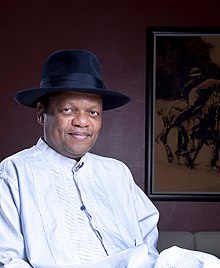The Founder and pioneer CEO of Stanbic Bank Plc, Atedo Peterside, has kicked against Nigeria’s foreign exchange (forex) allocation policy, saying it is skewed in favor of a handful.
Speaking at the Vanguard Economic Focus themed: ‘National Plans & Performance: Gaps, Learnings & Opportunities’, in Lagos, Peterside said there was no level playing field in the allocation of forex to businesses.
Hear him: “Many countries in the world have a level playing field. Why will you come and invest in an economy, where three people in the same sector in Nigeria, one will be getting forex at N420 to dollar, the next one will be getting at an average of about N500 to dollar and the last one with wrong parentage, will be paying N580 to dollar”.
Continuing, he said: “We deliberately rigged the economy, in favor of a handful of people so that they can do very well. The first thing you need before an economy can grow, is a level playing field. This economy is rigged in favor of a handful of people. When they say, there is an investment, yes, by a handful of people only. This thing has to be corrected, unless that is done, we are going no where”.
“I think change is coming , in whatever form it will come next year. We need to sort out something, that elsewhere in Africa doe not event exist. As long as we allow a handful of people to rig everything in their own favor, we are going no where,” Peterside stated.
He said besides forex allocation anomaly, investors are moving their funds to other African countries where there is a level playing field for all.
Other speakers at the programme also agreed that the government has treated the private sector unequally. They added that the private sector can only thrive where there is a level playing field.
Speaking further on the economy in retrospect, Peterside, who was the Chairman of the occasion, said: “The Nigerian economy was one of the fastest-growing until 2014. It grew steadily for 15 years but since 2015, it has been declining steadily. Nigeria is among the countries that have become laggards. We need to ask ourselves what has changed.”
“This is not because other economies are also not growing. Others are growing but we are lagging. Investor confidence in the Nigerian economy is declining because there’s no level-playing field for the investors. The economy has been rigged to favour a few. To grow the economy, we have to create a level-playing field,” he said.
Peterside noted that “regrettably, the sectors that are thriving today are the ones that the government is not involved: ICT and creatives. This is because there is a level-playing field for all players in the two industries.”
Also speaking, a representative of the Manufacturers Association of Nigeria (MAN) Rushed Adegbenro, said the government has not allowed the private sector to function as it should.
“The government is still holding the key to the private sector. Aside from the challenge of Policy somersaults, which has made the policy environment un-conducive, there is no level-playing field,” he said.
Also speaking, Chairman of the Foundation for Economic Research and Training (FERT) Lagos, Prof. Akpan Ekpo, said all economies have development plans – short-term and/or long-term to ensure sustained economic growth and development.
He added that a strategic thinking government would ensure that its plan is properly implemented.
“In Nigeria, the leadership, bureaucrats, and technocrats have conceptualised, formulated, and implemented various economic plans with inherent programmes and projects with the objective of fast-tracking development yet the outcomes are nothing to write home about,” he said.
“Economic development has always been propelled by classes and groups interested in a new economic and social order, has always been opposed and obstructed by those interested in the preservation of the status quo, rooted in and deriving innumerable benefits and habits of thoughts from the existing fabric of society, the prevailing mores, customs and institutions,” he said.



